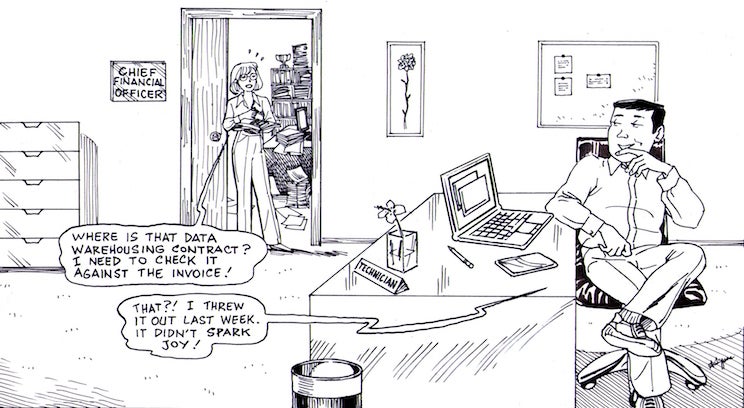
The fascination with Japan’s Marie Kondo and her tidying methods is sweeping the world. Her book, The Life-Changing Magic of Tidying Up, has been translated into Korean, Chinese, Spanish, Indonesian, French, German, Swedish, Portuguese, and English. One wonders when it is going to spread outside the home to arrive, presumably neatly folded, in your corporate workplace.
Most in-house lawyers agree: The number one item in the legal workplace that needs tidying is contracts. With the rise of software as a service (SaaS), businesses are hiring more specialists and suppliers than ever before.
We use Amazon Web Services and Azure instead of buying our own servers. Our IT departments use Twilio, a cloud communications company, rather than writing our own code to send messages. And our customer service teams often rely on offshore call centers run by a third party. The result of all this specialization is an explosion in the number of business relationships — which means a corresponding explosion of contracts.
A key insight of Marie Kondo’s is that the import of objects and items extends into our psyches and lives, well beyond the four corners of the knick-knacks gathering dust in our living room curio cabinet. This means that increased attention to these physical items will likely ripple through to the rest of our lives. This is illustrated by anecdotal feedback from Kondo’s clients:
“Your course taught me to see what I really need and what I don’t. So I got a divorce. Now I feel much happier.”
“I’m delighted to report that since cleaning up my apartment, I’ve been able to really increase my sales [at work].”
“My husband and I are getting along much better.”
For businesses, contract documents represent a physical manifestation of a deeper relationship. The value of the contracts is not reflected their paper pages or Courier fonts, but in their facilitation of business relationships. And neglecting these documents is a sign that we are neglecting our relationships.
So what would Kondo say about our overflowing stacks of contracts? First and foremost, storage is not an answer. It is a “booby trap,” she writes. This is because “[p]utting things away creates the illusion that the clutter problem has been solved,” but “sooner or later, all the storage units are full, the room once again overflows with things [...] creating a negative spiral.”
Most corporations act just as Kondo’s homeowner clients: They mistake storing their contracts for extracting value from them. Storage is the main concern of traditional contract management databases, whether purchased commercially or homegrown.
Moving beyond using the contract management database for simple file storage is an extraordinary challenge for established companies. Each contract needs to be read, and relevant business terms need to be identified and surfaced. Wouldn’t you rather sort through 100 pairs of unused socks than study 20,000 contracts?
Kondo would say we need to go beyond storing these contracts: We need to study the terms of each one and determine its usefulness relative to its obligations. Out of sight is not truly out of mind. Rather, by not keeping our contractual details in sight, we will worry perpetually about forgotten rights and obligations.
Perhaps forcing the use of pre-written templates for your new contracts is the path to corporate spiritual cleanliness and balance? Not according to Kondo, who notes that “if your house is cluttered, the effect of polishing the toilet bowl is going to be limited.” In other words, the place to begin tidying one’s business relationships is to start by working on the agreements.
The process of reviewing the key terms of your business relationships can be its own reward. Kondo professes that through such a review, “You can see quite clearly what you need in life and what you don’t, and what you should and shouldn’t do.” Think about the great feeling you get from catching pesky auto-renewals from troublesome vendors before the notice date. It’s just as exciting as a clean garage!




